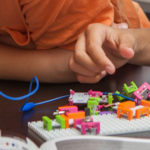The induced or spontaneous change of one element into another.
Transformation is the act of adapting, changing, improving, metamorphosis. All through the ages, libraries have been one of the greatest places for change. From the scrolls at the Library of Alexandria to the ability to check out a lawn mower today, Libraries epitomize transformation. We adapt to the needs of our communities; providing services, spaces, and items that will help improve the lives of our patrons.
School libraries are currently in a state of flux. The advancement of digital resources combined with the need for Makerspaces, and unique needs of our students require that librarians be adaptable for the students they serve. What our students expect from the library is changing. Digital resources mean constant connection. The print book is still king, but they also want eBooks and audiobooks they can download. The need for students to problem solve and work in a collaborative environment have made way for the Maker movement and Makerspaces in our schools.
Libraries are no longer the quiet, orderly places remembered in childhood. The library spaces have transformed themselves into what the students need. Flexible, comfortable and welcoming should describe libraries. Libraries are the town squares of yesteryear. It is where students, teachers and parents come to collaborate, share, play and plan.
Along with the physical transformations we are also seeing a personal transformation in library staff. Students want a connection with their librarian as not only someone who can recommend a great book, but also as someone who can help them navigate the digital world around them, and help them find the answers they are seeking.
As the children of today enter the doors of the schools and the libraries, it is more important than ever to meet them where they are, give them what they need, and help them find the answers they seek. Libraries must remain in the state of flux always, as the world is constantly changing, so are the patrons we serve. They are the reason we are here, not the items contained in our walls.






